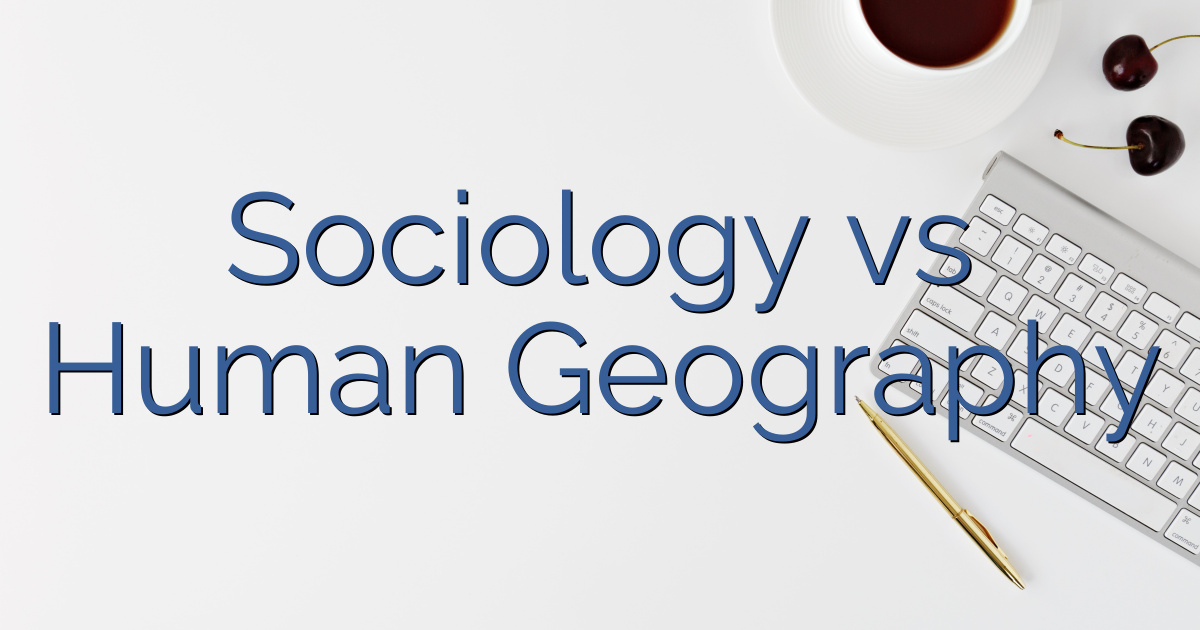 Are you torn between the fascinating realms of Sociology and Human Geography? Delve into the intricate world of these majors as we explore their nuances, curriculum, and career prospects.
Uncover the analytical skills they cultivate and the job roles they open up. Discover the potential salaries and similarities in their curriculums.
With this comprehensive breakdown, you’ll gain valuable insights to help you decide which path aligns with your passions and aspirations.
Are you torn between the fascinating realms of Sociology and Human Geography? Delve into the intricate world of these majors as we explore their nuances, curriculum, and career prospects.
Uncover the analytical skills they cultivate and the job roles they open up. Discover the potential salaries and similarities in their curriculums.
With this comprehensive breakdown, you’ll gain valuable insights to help you decide which path aligns with your passions and aspirations.
Table of Contents
Key Takeaways – Sociology vs Human Geography
- Sociology relies on surveys, interviews, and quantitative data analysis, while human geography employs qualitative methods like ethnographic research and spatial analysis.
- Sociology focuses on social structures, power dynamics, and societal institutions, while human geography emphasizes spatial patterns, place-making, and the relationship between people and their environment.
- Sociology explores social inequality, race and ethnicity, gender, and social change, while human geography focuses on landscapes, population distribution, urbanization, and globalization.
- Both sociology and human geography develop analytical skills to examine social phenomena and spatial relationships, but they apply them to different areas such as social policy development and community organizing for sociology, and urban planning and environmental management for human geography.
Overview of the two majors: Sociology Vs. Human Geography
Sociology and human geography are two distinct majors, each offering unique perspectives on society and its spatial dimensions. When it comes to research methods, sociology tends to rely heavily on surveys, interviews, and quantitative data analysis. On the other hand, human geography often employs qualitative methods such as ethnographic research, participant observation, and spatial analysis. Theoretical frameworks also differ between the two disciplines. Sociology tends to focus on social structures, power dynamics, and the impact of societal institutions on individuals. Human geography, on the other hand, places greater emphasis on spatial patterns, place-making, and the relationship between people and their environment. While both majors study society and its spatial dimensions, their research methods and theoretical frameworks provide distinct lenses through which to understand the social world.Overview of the curriculum and courses of the two majors
The curriculum and courses for the two majors provide you with a comprehensive understanding of society and the environment. In both sociology and human geography, key concepts are explored to analyze and interpret the complexities of social structures, cultural practices, and spatial patterns. Sociology courses delve into topics such as social inequality, race and ethnicity, gender, and social change. Human geography courses focus on the study of landscapes, population distribution, urbanization, and globalization. These majors equip you with analytical skills to examine social phenomena and spatial relationships. Moreover, the practical applications of sociology and human geography in society are numerous. Sociologists contribute to social policy development, community organizing, and research on social issues. Human geographers play a vital role in urban planning, environmental management, and regional development.Overview of coursework, assessments, and assignments
Coursework, assessments, and assignments in both sociology and human geography majors provide you with opportunities to apply theoretical knowledge and develop critical thinking skills. In sociology, coursework requirements typically include studying social theories, research methods, and topics such as inequality, race, and gender. Assessments often involve analyzing social phenomena and conducting empirical research. Assignments may include writing research papers, conducting surveys, or participating in group discussions. In human geography, coursework requirements focus on topics such as urbanization, globalization, and spatial analysis. Assessments often involve analyzing geographic data and conducting fieldwork. Assignments may include mapping exercises, analyzing satellite imagery, or conducting interviews with local communities. Both majors offer practical fieldwork opportunities that allow you to apply theoretical concepts to real-world situations and gain valuable hands-on experience.| Sociology | Human Geography |
|---|---|
| Social Theories | Urbanization |
| Research Methods | Globalization |
| Inequality, Race, and Gender | Spatial Analysis |
| Analyzing Social Phenomena | Geographic Data Analysis |
| Empirical Research | Fieldwork |
| Research Papers, Surveys, Group Discussions | Mapping Exercises, Satellite Imagery Analysis, Community Interviews |
Comparison of Analytical Skills Developed
When comparing the analytical skills developed in sociology and human geography, you’ll find that both majors provide you with the ability to critically analyze social and spatial phenomena. In sociology, you’ll develop critical thinking skills through the examination of social structures, institutions, and interactions. This includes analyzing patterns of inequality, power dynamics, and social change. Human geography, on the other hand, focuses on the spatial aspects of human behavior and the environment. You’ll learn to critically analyze the distribution of resources, patterns of urbanization, and the impacts of globalization. Both disciplines also emphasize the application of research methods to gather and analyze data. This includes conducting surveys, interviews, and observational studies to better understand social and spatial phenomena. Ultimately, both sociology and human geography provide you with the necessary skills to critically analyze complex social and spatial issues.Comparison of Career Opportunities and Job Roles in Sociology Vs. Human Geography
If you’re interested in pursuing a career in either sociology or human geography, you’ll discover a wide range of job opportunities and roles available to you. When it comes to the job market trends, both fields offer promising prospects. Sociology focuses on the study of society, social behavior, and the impact of various social factors on individuals and communities. Human geography, on the other hand, examines the spatial distribution of human activities and their relationship with the environment. In recent years, the job market for both sociology and human geography has seen a growing demand for professionals in areas such as research, data analysis, urban planning, policy development, and social advocacy. The impact of technology on careers in sociology and human geography has been significant. Technological advancements have provided new tools and methods for data collection, analysis, and visualization. This has enhanced the ability of professionals in both fields to conduct empirical research and make evidence-based decisions. Additionally, technology has expanded the scope of work in areas such as digital mapping, remote sensing, and geographic information systems (GIS). These advancements have opened up new career opportunities in fields like geospatial analysis, digital marketing, urban development, and social media research. As technology continues to evolve, it will undoubtedly shape the future of careers in sociology and human geography, requiring professionals to adapt and stay updated with the latest tools and techniques.Comparison of Salary Potential in Sociology Vs. Human Geography Careers
The salary potential in careers related to sociology and human geography can vary depending on factors such as experience, education, and location. When comparing the long-term earning potential in sociology versus human geography careers, it is important to consider the nature of the work and the demand for professionals in each field. In sociology, individuals with advanced degrees and specialized knowledge have the potential to earn higher salaries, especially in research and academia. On the other hand, in human geography, professionals who work in urban planning or geographic information systems (GIS) tend to have higher earning potential due to the increasing demand for their expertise. Factors such as the industry, geographical location, and level of experience also contribute to salary differences in sociology and human geography jobs. Ultimately, individuals should carefully consider their interests and skills when choosing a career path to ensure long-term success and financial stability.Similarities between sociology and human geography curriculums
To understand the similarities between the curriculums of sociology and human geography, you should explore common themes such as social structures, cultural patterns, and spatial relationships. These two disciplines share a number of similarities in their approach to studying society and human behavior. Here are four key similarities between the curriculums of sociology and human geography:- Interdisciplinary approaches: Both sociology and human geography draw upon concepts and theories from various disciplines such as anthropology, economics, and psychology to understand the complexities of human society and its relationship with the environment.
- Focus on social structures: Both disciplines examine how social structures, such as institutions, organizations, and networks, shape individuals’ behavior and interactions within society.
- Study of cultural patterns: Sociology and human geography explore how culture influences individual and group behavior, beliefs, and values, and how these cultural patterns vary across different societies and geographic locations.
- Analysis of spatial relationships: Both disciplines analyze the spatial distribution of social phenomena, exploring how geography affects social processes, inequalities, and the formation of communities.
Difference between the two majors: specialization
To specialize in either sociology or human geography, you can choose to focus on areas such as urban studies, environmental sustainability, or social inequality. These specializations allow you to delve deeper into specific topics within your chosen field, and can greatly enhance your understanding and expertise. In terms of job prospects, specializing in a particular area can make you more marketable to employers who are seeking individuals with specialized knowledge and skills. For example, if you specialize in urban studies, you may find job opportunities in urban planning, community development, or policy analysis. Similarly, if you specialize in environmental sustainability, you may find job prospects in environmental consulting, sustainability planning, or resource management. Specializing in a particular focus area can open up a wide range of career possibilities, allowing you to apply your knowledge and skills to real-world issues and challenges.| Specialization Focus | Job Prospects |
|---|---|
| Urban Studies | Urban planning, Community development, Policy analysis |
| Environmental Sustainability | Environmental consulting, Sustainability planning, Resource management |
| Social Inequality | Social policy analysis, Nonprofit organizations, Advocacy work |
How Does Anthropology Differ from Sociology in the Study of Human Society?
Anthropology and sociology differences can be seen in their approaches to studying human society. While sociology focuses on social structures, institutions, and group behavior, anthropology examines cultures, traditions, and beliefs of various societies. Anthropology also emphasizes fieldwork and ethnography, while sociology often utilizes statistical analysis and surveys.
Factors to consider when choosing between sociology and human geography majors
When deciding between sociology and human geography majors, it’s important to consider factors such as your interests, career goals, and strengths. Both majors offer unique perspectives on the study of society and human behavior, but they also have distinct differences that can impact your future career path. Here are some factors to consider when making your decision:- Interests:
- Are you more interested in studying social structures and interactions (sociology) or the spatial relationships between people and their environment (human geography)?
- Do you prefer conducting research or analyzing data?
- Career Opportunities:
- Sociology majors often pursue careers in social work, counseling, or research.
- Human geography majors can find employment in urban planning, environmental consulting, or geographic information systems.

